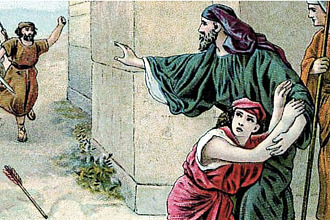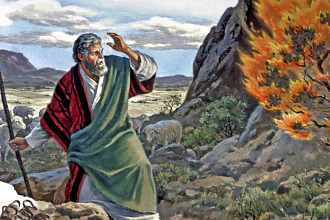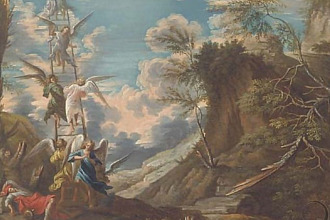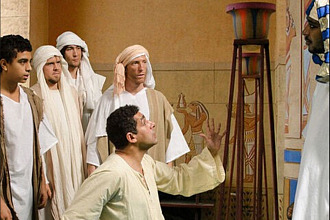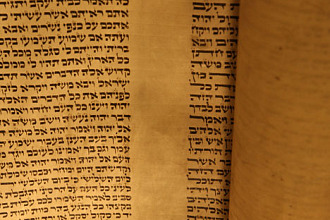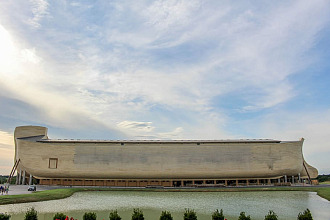Parasha for the Week: Korach Numbers 16:1 – 18:32.
Haftara for the Week: 1 Samuel 11:14 – 12:22.
Besorat Yeshua: Mark 5:9 – 20.
Overview
Korach, Datan and Aviram, and 250 leaders of Israel rebel against the authority of Moshe and Aharon. The rebellion results in their being swallowed by the earth.
Many resent their death and blame Moshe. G-d’s “anger” is manifest by a plague that besets the nation, and many thousands perish. Moshe intercedes once again for the people. He instructs Aharon to atone for them and the plague stops. Then G-d commands that staffs, each inscribed with the name of one of the tribes, be placed in the Mishkan. In the morning the staff of Levi, bearing Aharon’s name, sprouts, buds, blossoms and yields ripe almonds.
This provides Divine confirmation that Levi’s tribe is chosen for priesthood and verifies Aharon’s position as Kohen Gadol, High Priest.
The specific duties of the levi’im and kohanim are given. The kohanim weren’t to own land, but were to receive their sustenance from the tithes and other mandated gifts brought by the people.
Laws of the first fruits, redemption of the firstborn, and other offerings are given.
"Rebellion Against G-d"
Korach was of the tribe of Levi, a cousin of Moshe and Aaron. Jealous of Moshe’s and Aaron’s leadership, he gathered 250 people together and rebelled against Moshe and Aaron. Korach claimed, “The entire congregation is holy... Why do you exalt yourselves above the congregation of the L-rd?” Moshe warned Korach that his uprising was against G-d. When Korach didn’t repent, Moshe told everyone to distance themselves from Korach. “The earth opened its mouth and swallowed them up and their households.” Korach his household disappeared into the ground. The others who remained in rebellion were burnt in a fire sent from G-d.
“Constructive or Destructive Jealousy”
Rabbi Zalmen Marozov states that the Torah is not a book of stories, but living directives on how to conduct our lives. This is implied by the name “Torah” — “teaching and guide.” The teachings of the Torah apply continuously. This is especially true of the lesson we should learn from the story of Korach, as Rabbi Eliezer says “Envy, lust and the seeking of honor drive a person from the world.” The Talmud says that a person should be careful not to put one’s eyes (i.e not to desire and envy) what does not belong to them; “For Korach wanted something which did not belong to him, as a result, not only didn’t he get what he desired, but he also lost what he already had!” Jealousy is one of the worst qualities a person can possess.
“Who Are Your Neighbors?”
Korach managed to convince two hundred and fifty people from the neighboring tribe of Reuben to join the revolt. He told them, “The entire congregation is holy and G-d is among them.” In other words, there is no need for Moshe and Aaron’s leadership for we are as holy and as close to G-d as they are. Moshe warned the people to disassociate from Korach and his compatriots, Dathan and Abiram, who were rebelling against G-d.
It teaches us two lessons: The first is how we should avoid being involved in unrighteous rebellions. The Torah says, “they should not be like Korach and his congregation.” From this our sages derive that it is a sin to be involved in quarrels and divisiveness as Korach was.
Another important lesson is to respect those who God places in position of authority. It is easy for us to think we are all equal, all holy, and that no one should have any authority or position over anyone else, but we do not see that as a Biblical principle. On the contrary we see God rose up leaders, some better than others, all imperfect, yet still His leaders.
“Who is He?”
When Moshe reprimands Korach for seeking the priesthood, he concludes: “you and those who gather together are against the Almighty; and Aharon, who is he that you complain against him?” (Numbers 16:11) What did Moshe mean when he said, “and Aharon, who is he”?
Offenses against us are nothing compared to what those offenses say against God. We are as nothing, God is everything. When we come in contact with a very critical person, we need not take offense at what he says. This is the way he speaks to all people so there is no reason to take it personally. Realize that the problem is his, not yours, and you free yourself from any possible hurt feelings from what he says.
“Sin Against the Ruach Elohim”
Korach, Datham and Abiram and their followers committed the sin against the Ruach Elohim, a sin by which man’s heart is effectually hardened against the influence of divine grace. “Whoever speaks a word against the Son of man,” said Mashiach, “will be forgiven, but whoever speaks against the Ruach Elohim, Will not be forgiven” (Matatyahu 12:32). These words were spoken by the Mahiach when the gracious works which He had performed through the power of G-d were attributed to Beelzebub. It is through the agency of the Ruach Hakodesh that G-d communicates with man; and those who deliberately reject this agency as satanic, have cut off the channel of communication between the soul and Heaven.
G-d works by the manifestation of His Ruach to reprove and convict the sinner; and if the Ruach Elohim’s work is finally rejected, there is no more that G-d can do for the soul. The last resource of divine mercy has been employed. The transgressor has cut himself off from G-d, and sin has no remedy to cure itself. There is no reserved power by which G-d can work to convict and convert the sinner. “Let him alone” (Hosea 4:17) is the divine command. Then “For if we willfully persist in sin after having received the knowledge of the truth, there no longer remains a sacrifice for sins, but a fearful prospect of judgment, and a fury of fire that will consume the adversaries” (Hebrews 10:26, 27; based on PP 405).
HAFTARA 1 Samuel 11:14 – 12:22
Parasha: In the text of the parasha the people of Israel are not happy that Moses and Aaron are keeping the great responsibilities of Governance and Priesthood to themselves. Moses and Aaron were brothers and it seemed to the people and especially to 250 leaders who were influenced by Korach that a conflict of interest had occurred. “You have gone too far! All the congregation are holy, everyone of them, and the L-RD is among them. So why then do you exalt yourselves above the assembly of the L-RD? (Num. 16:3).
Haftara: In our haftara the people of Israel challenge the authority of Samuel and G-d and decide to have a new king. But Samuel is not satisfied and wants to be sure that nobody accuses him of anything wrong during his time of leadership. “I have listened to you in all that you have said to me, and have set a king over you. See, it is the king who leads you now; I am old and gray, but my sons are with you. I have led you from my youth until this day. Here I am; testify against me before the L-RD and before his anointed. Whose ox have I taken? Or whose donkey have I taken? Or whom have I defrauded? Whom have I oppressed? Or from whose hand have I taken a bribe to blind my eyes with it? Testify against me and I will restore it to you.” (1Sam. 12:1-3). The people confirmed to Samuel that they have no reproach against him. “You have not defrauded us or oppressed us or taken anything from the hand of anyone.” (1Sam. 12:4). Samuel recalls to the people of Israel all the mistakes they have made during their history from the time of Jacob to the present. The L-rd confirmed Samuel by sending thunder, “and the L-RD sent thunder and rain that day; and all the people greatly feared the L-RD and Samuel (1Sam. 12:1-3). And Samuel said to the people, “Do not be afraid; you have done all this evil, yet do not turn aside from following the L-RD, but serve the L-RD with all your heart; For the L-RD will not cast away his people, for his great name’s sake, because it has pleased the L-RD to make you a people for himself. (1Sam. 12:21-22).
Besorat Yeshua Mark 5:9 – 20
Parasha: In the text of the parasha we have the story of the rebellion of Korach. When we look carefully at this text we recognize the principle of the first rebellion, the great rebellion of Satan: You said in your heart, “I will ascend to heaven; I will raise my throne above the stars of G-d … I will make myself like the Most High.” (Is. 14:13- 14). Korach wanted to make himself like Moses. We know that Moses and Aaron were appointed by G-d and when Korach challenged the authority of Moses and Aaron, he challenged the authority of G-d. This rebellion was possible because Korach was possessed by the same spirit as Satan. He was trying to flatter or to charm the people of Israel when he said “All the congregation are holy” (Numb 16:3).
Besorah: In the Besorah of Mark we have a parallel story, a story of demonic possession. It is about the possession of a man, “And when he had stepped out of the boat, immediately a man out of the tombs with an unclean spirit met him. He lived among the tombs; and no one could restrain him anymore, even with a chain” (Mark 5:2-3). Yeshua recognized that this man was possessed by one or several demons, fallen angels. He asked them a question: “What is your name?” He replied, “My name is Legion; for we are many.” (Mark 5:9).
They knew who Yeshua was and begged him earnestly not to send them out of the country. Now a great herd of swine was feeding on the hillside there and the unclean spirits begged him, “Send us into the swine; let us enter them” (Mark 5:10-12). Here we see the great power of Yeshua who gained victory over evil, Satan and all demons, “So he gave them permission. And the unclean spirits came out and entered the swine; and the herd, numbering about two thousand, rushed down the steep bank into the sea, and were drowned in the sea” (Mark 5:13).










